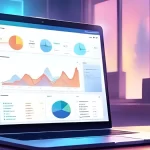A general ledger (GL) is a fundamental component of accounting that helps businesses keep track of their financial transactions and prepare financial reports. It consists of a set of numbered accounts that categorize different types of assets, liabilities, equity, revenue, and expenses.
The GL is organized into a chart of accounts, which lists all the accounts used by the business. Certified public accountants (CPAs) and bookkeepers typically access and use the general ledger to monitor finances, track transactions and cash flow, compile business reports, and prevent accounting errors and fraud. Each entry in the general ledger follows the double-entry accounting method, where every debit has a corresponding credit entry and vice versa.
The general ledger works in conjunction with subsidiary ledger accounts, such as cash, accounts payable, accounts receivable, and inventory, to summarize transactions. It also plays a crucial role in generating financial statements, such as the balance sheet and income statement. General ledger accounts are not budget accounts and show actual amounts spent or received. Companies may choose to store their general ledger using blockchain technology for enhanced security and data integrity.
Table of Contents
Understanding General Ledger
Understanding the general ledger is essential for those involved in accounting and bookkeeping. The general ledger serves as a central repository for all financial transactions and plays a vital role in recording, organizing, and classifying these transactions. Its purpose is to provide accurate and up-to-date financial information that can be used to prepare various reports, such as balance sheets and income statements.
By utilizing the general ledger, businesses can track their financial performance, analyze trends, spot errors or fraudulent transactions, and make informed decisions based on the financial data.
The general ledger follows the principles of double-entry accounting, ensuring that each transaction has a matching debit and credit entry. It works in conjunction with subsidiary ledgers to provide a comprehensive view of the company’s financial activities. An integrated accounting system can automate this process, making it more efficient and accurate.
Strategies for Integrating General Ledger with ERP Finance Modules
Integrating the general ledger with ERP (Enterprise Resource Planning) finance modules offers several benefits for businesses. By seamlessly integrating these systems, organizations can achieve a streamlined and efficient financial management process.
One effective strategy for integrating the general ledger with ERP finance modules is to implement accounting platforms for Philippine businesses that allows for data integration. This software should have the capability to automatically sync data between the general ledger and other finance modules, ensuring a seamless flow of information. By eliminating the need for manual data entry and reducing the risk of errors, this integration strategy improves financial reporting accuracy and saves valuable time and resources.
Another key strategy is to establish standardized processes and workflows across the finance department. This ensures consistency in recording and categorizing financial transactions, making it easier to integrate the general ledger with ERP finance modules. By implementing standardized procedures, organizations can enhance the accuracy and reliability of their financial data and improve overall efficiency.
Proper training for employees is also crucial when integrating the general ledger with ERP finance modules. Employees need to be familiar with the integrated system and understand how to navigate the software efficiently. By providing comprehensive training, organizations can ensure that employees are equipped with the necessary skills to utilize the integrated system effectively and make the most out of its features.
Overall, integrating the general ledger with ERP finance modules enables real-time data updates, eliminates manual data entry errors, improves financial reporting accuracy, and provides better visibility into the financial health of the business. It also allows for more efficient and automated financial processes such as accounts payable and accounts receivable management, budgeting and forecasting, and financial analysis. By implementing effective integration strategies, businesses can streamline their financial processes and drive better decision-making.
Also read: What are Adjusting Journal Entries in Accounting?
Benefits of General Ledger in ERP
The inclusion of a general ledger in an ERP system enhances the benefits of ERP in terms of financial management. The general ledger serves as a centralized repository for financial data, providing a single source of truth for all financial transactions. This centralization improves data accuracy and reduces discrepancies that can occur when multiple systems are used.
By integrating the general ledger with other ERP modules, businesses can achieve a high level of financial visibility, enabling better decision-making and strategic planning. The general ledger allows for centralized data, ensuring that all financial information is accessible in one place. This simplifies the process of tracking financial transactions and enables businesses to gain a holistic view of their financial health.
In addition to centralized data, the general ledger enhances the accuracy of financial reporting. By recording all transactions correctly and in a timely manner, businesses can generate accurate and reliable financial statements. This accuracy is crucial for regulatory compliance and maintaining investor confidence.
The general ledger in an ERP system also promotes overall financial management and centralization. It streamlines the process of recording and tracking financial transactions, eliminating the need for manual data entry and reducing the risk of errors. With a centralized and accurate general ledger, businesses can easily generate reports, analyze financial performance, and make informed decisions.
Overall, the general ledger in an ERP system provides numerous benefits, including centralized data, financial visibility, accurate reporting, and improved financial management. By harnessing the power of the general ledger, businesses can streamline their financial processes, enhance decision-making capabilities, and ensure the integrity and accuracy of their financial data.
Also read: Closing Entry in Accounting: Definitions, Types, and Examples
Key Benefits of Incorporating General Ledger into ERP Systems
Incorporating the general ledger into ERP (Enterprise Resource Planning) systems offers several key benefits for businesses. Firstly, it ensures data integrity and consistency by maintaining a single source of financial information across all ERP modules. This eliminates the need for manual data entry and reduces the risk of errors and discrepancies.
Secondly, incorporating the general ledger into ERP systems streamlines financial processes, such as accounts payable, accounts receivable, and financial reporting. This leads to improved process efficiency and productivity.
Thirdly, the integration of the general ledger with ERP systems enables real-time financial updates and provides accurate and up-to-date financial information for decision-making. With the general ledger integrated into the ERP system, businesses can access real-time data on their financial performance, allowing them to make informed decisions promptly.
Finally, incorporating the general ledger into ERP systems allows for seamless data flow and integration between different departments and functions within the organization, fostering collaboration and improving overall financial management. By consolidating financial processes and information in one system, businesses can achieve data consistency and streamline their financial operations.
With the general ledger at the heart of your ERP system, you can unlock a new level of financial visibility and control. But to truly maximize the benefits, it’s essential to consider the total cost of ownership and ensure that your system is tailored to your unique business needs.
Get a clear picture of your costs and discover the value our ERP system can bring to your business.
General Ledger Features
A general ledger offers several key features that facilitate financial tracking, reporting, and account reconciliation. These features play a significant role in ensuring accurate and efficient financial management.
One of the key features of a general ledger is its ability to track and record financial transactions. With a general ledger, you can easily record all the inflows and outflows of money within your organization. This enables you to have a clear understanding of your financial position at any given time.
Another important feature of a general ledger is its reporting capabilities. By using the data stored in the general ledger, you can generate various types of financial reports, such as balance sheets, income statements, and cash flow statements. These reports provide valuable insights into your organization’s financial performance and help you make informed business decisions.
Moreover, a general ledger facilitates account reconciliation. It allows you to compare your recorded transactions with external sources, such as bank statements, to ensure the accuracy of your financial records. Account reconciliation helps identify any discrepancies or errors, allowing you to correct them and maintain the integrity of your financial data.
Overall, the key features of a general ledger, including financial tracking, reporting capabilities, and account reconciliation, empower businesses to effectively manage their finances and make informed decisions based on accurate and up-to-date financial information.
Best Practices for General Ledger Management
When it comes to managing your general ledger, following best practices is essential to maintain financial controls, ensure data accuracy, and produce accurate financial reports. By implementing these practices, you can streamline your accounting processes and improve the overall integrity of your financial data.
One crucial best practice is to establish strong financial controls. This involves implementing policies and procedures that govern how financial transactions are recorded and monitored. By enforcing segregation of duties, regularly reviewing and approving transactions, and conducting periodic audits, you can reduce the risk of errors and fraudulent activities.
Another key practice is to prioritize data accuracy. This involves consistently recording and reconciling financial transactions, ensuring that the information in your general ledger is up-to-date and error-free. Regular account reconciliations help identify discrepancies and minimize the risk of inaccurate financial reporting.
Finally, it’s important to adhere to a strict period closing process. By establishing a defined closing process, you ensure that all financial transactions for a given period are accurately recorded and accounted for. This process includes reconciling accounts, preparing financial statements, and conducting a thorough review to identify any potential issues or discrepancies.
By implementing these best practices for general ledger management, you can enhance the effectiveness of your financial reporting, maintain data integrity, and make well-informed business decisions based on accurate and reliable information.
HashMicro ERP system offers automation to deal with general ledger management. You can arrange your general ledger and suit your business requirements more effectively. Try the free demo now!


























